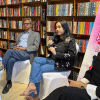‘The Aid Lab: Understanding Bangladesh’s Unexpected Success’: Naomi Hossain’s book finally meets Bangladesh

With an international reputation for its scholarly publications on Bangladesh, The University Press Limited (UPL) has consistently cultivated some of the country's best academic, and even literary, work—its domains encompassing politics, sociology, gender, development, and everything Bangladesh. UPL's publication of Naomi Hossain's book, The Aid Lab: Understanding Bangladesh's Unexpected Success, is no exception to this tradition. The book, at once a rupture within the long silence surrounding the 1974 famine and a critique of the aid industry, had originally been published by Oxford University Press in 2017—but this Bangladesh edition is endowed with a new introduction and a postscript in light of the historic July 36, 2024 uprising that ousted the authoritarian Awami League regime. On January 18, UPL hosted The Aid Lab's publication ceremony at The Bookworm in Shahabuddin Park.
The panellists included not only author Dr Naomi Hossain herself, but also Navine Murshid, Professor at Colgate University and author of India's Bangladesh Problem, Professor Asif M Shahan from the Department of Development Studies, University of Dhaka, and Afsan Chowdhury, researcher and author of numerous books on 1971. This powerhouse of a panel enriched key questions raised by the book—most interestingly: How is the 1974 famine integral to the "Bangladesh paradox" wherein authoritarianism and development coexist? How has the famine transformed Bangladesh into a metaphorical aid "laboratory," that is, a site of experimentation for various foreign aid projects?
The Aid Lab "ask[s] you to pause and be angry": Professor Murshid blazed open the talk by touching upon the "rage" aspect of the book—rage at the famine-induced death of 1.5 million people, rage at the "experimentation with starvation," and yet a rage that is easy to overlook as our bodies fight to protect us from the collective guilt implicit in such disasters. But "how else are we to overcome the historical-political amnesia that has overcome our culture?" she asked.
Dr Hossain continued this train of thought when she cited the widespread reluctance toward discourse about the famine as a driving force behind her book. This silence manifests itself in, for example, the absence of memorials or artefacts in the Liberation War Museum. Indeed, Dr Hossain had been waiting eight years for the distribution of her book in Bangladesh because after the 2018 'election', there was no way a book about a famine that happened under the watch of Bangabandhu would be published. In reply to an apt question about whether she encountered difficulties while gathering sources, Dr Hossain mentioned that news articles on the 1974 famine weren't available in DU libraries. This might remind us of the famine-information-blackout facilitated by the state-owned newspaper at the time, amidst the concurrent repression of all other newspapers by the ruling BAKSAL party. However, the famine is also a sensitive topic for us as a nation, a hushed source of shame almost—and The Aid Lab seems to me a nuanced voice that pierces the chamber of this muted famine discourse.
Food as a tool for foreign policy was weaponised, and so was the vulnerability of a state post-liberation war, according to Professor Murshid. For instance, Bangladesh became a testing ground for birth control implants, exponential growth for NGOs, etc. Similarly, Dr Hossain mentioned the case of Norplant, a contraceptive that was tested on the bodies of women in Bangladesh and banned in the US because it was too dangerous. When the mic was passed on to Professor Shahan, however, he singled out food policies as an exception to the unstable nature of all other policies—including women's development and local government policies—that changed with every regime change. Interestingly, when it came to food policies, each regime instead tried to productively build on the previous—setting aside its authoritarian inclinations. The Aid Lab, according to him, questions why this has remained stable. The memory of the famine, as it appears, looms large on the design of food security policies.
Professor Shahan offered a stellar explanation as to why the state has consistently adopted pro-poor policies despite its authoritarian leaning. Given that the regime "needs to legitimise its rule to stay in power," the need to ensure people don't die of starvation remained important in policy-making post-Bangabandhu. Bearing in mind Bangabandhu's assassination in 1975, it seemed to me that the state's ensuing commitment to pro-poor policies stemmed from an interest to protect its own sovereignty—here I couldn't help but think of Michel Foucault's theory of biopolitics. The state exercises power to "make live and let die," tailoring this formula to suit its survival needs—so in Bangladesh's case, make live the rural poor and let die the protestors of the July Uprising.
After distinguishing between input-oriented legitimacy (where you come by election) and output-oriented legitimacy (where you need to perform and satisfy in order to stay in power), Professor Shahan argued that this performance-oriented legitimacy emerged ever since the authoritarian lean—and we all witnessed it pushed again and again in the last decade, in tandem with the idea that "we can have development at the expense of democracy." Hence, post-1974, the rulers realised that to stay in power, the ruling elite needs to take care of the poor—in Professor Shahan's words.
Then came the establishment of the "Aid lab," where Bangladesh offered herself as a lab for development partners in the absence of anything else to offer, save for a massive homogenous population. He concluded his talk with the resounding questions: Is August 5, 2024 another critical juncture? Shall we see it shaping politics and policies like the 1974 famine did? Will the demonstrated danger of fleeing the country when power is concentrated be enough to forge a new path for politics?
Author Afsan Chowdhury, who had witnessed the famine, affirmed the importance of performance-based legitimacy in Bangladesh. "We speak of a single Bangladesh, a single Liberation War," he critiqued. Instead of this conventional nationalistic reading of history, The Aid Lab locates economic progress as a seed in the aftermath of the 1974 famine rather than as a fruit of national political independence.
Its author, Naomi Hossain, smiling, and half-lamenting, at "the lack of grey hairs in the audience" of the book talk concluded on a hopeful note—with a call to the young generation to talk about this historical silence and to professors to get their students started on the topic.
Syeda Fatema Rahman is a writer from Dhaka, Bangladesh. Reach her at [email protected].

 For all latest news, follow The Daily Star's Google News channel.
For all latest news, follow The Daily Star's Google News channel. 










Comments